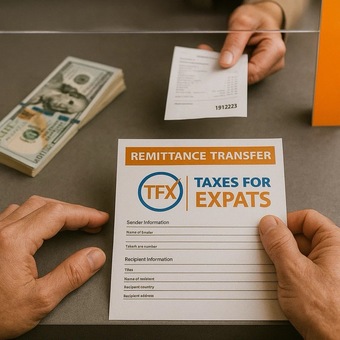Tax guide for Americans in Taiwan

Taiwan's tax system is multi-faceted, encompassing various types of taxes and regulations that apply to both residents and non-residents.
The purpose of this article is to provide a detailed overview of the Taiwanese tax system, focusing on the distinctions between resident and non-resident taxation, the types of taxes, tax rates, filing procedures, and specific considerations for expatriates, particularly those from the United States.
Table of contents
- Resident vs. non-resident of Taiwan
- Who can be considered a resident of Taiwan
- Types of taxes in Taiwan
- Tax rate in Taiwan compared to the US
- Filing an income tax return in Taiwan
- Types of income in Taiwan
- Social security in Taiwan
- Taiwan's pension system
- Tax deductions for expats in Taiwan
- The tax treaty between the US and Taiwan
- Most popular tax forms for US expats
- Taiwan tax forms for US expats
Resident vs. non-resident of Taiwan
The distinction between a resident and a non-resident in Taiwan is crucial as it determines the extent of an individual's tax liability.
- Residents: Residents are generally taxed on their worldwide income. This means that all income earned both inside and outside Taiwan is potentially taxable in Taiwan.
- Non-residents: In contrast, non-residents are only taxed on their Taiwan-sourced income.
This includes income earned within the territory of Taiwan but excludes foreign source income.
Who can be considered a resident of Taiwan
The criteria for determining tax residency in Taiwan are specific and include both physical presence and intent to reside.
- Physical presence: An individual is considered to be a tax resident of Taiwan if he or she is physically present in the country for more than 183 days in a given tax year.
This duration is a common benchmark in many jurisdictions and is used to measure the level of personal and economic ties an individual has with Taiwan. - Domicile and habitual residence: Apart from the physical presence test, residency can also be established based on domicile and habitual residence.
If an individual has a permanent home in Taiwan and spends a significant amount of time there, he or she may be considered a resident for tax purposes. - Special considerations for foreigners: The rules are slightly different for foreigners. In general, the 183-day rule is the primary criterion.
However, other factors such as purpose of stay, family ties, and economic interests in Taiwan may also be considered. - Year of arrival and departure: Special rules may apply in the year of arrival or departure.
The part of the year in which the individual is in Taiwan is taken into account in determining residency status.
Don’t overpay the IRS! Discover 15+ key tax breaks for US expats

Types of taxes in Taiwan
Taiwan's tax system comprises a variety of taxes, each designed to address different aspects of an individual's financial activities.
Individual income tax
IIT in Taiwan is a key component of the country's tax structure. It is levied on the income of both residents and non-residents but with different implications for each group.
For the 2024 IIT return, a resident alien will be subject to the following progressive tax rates:
| Taxable income (TWD) | Tax rate (%) |
| 0-560,000 | 5 |
| 560,001-1,260,000 | 12 |
| 1,260,001-2,520,000 | 20 |
| 2,520,001-4,720,000 | 30 |
| 4,720,001 and above | 40 |
Non-residents are taxed only on income earned in Taiwan. The tax rate for non-residents is generally a flat rate of 18% on Taiwan's taxable salary income, regardless of where the salary is paid.
Basic income tax
IBT is a supplemental tax system introduced in Taiwan to ensure a minimum level of taxation for certain high-income individuals, particularly those who may benefit from numerous deductions and exemptions under the regular income tax system.
The IBT is calculated based on an individual's consolidated gross income at a flat tax rate of 20%. This calculation does not take into account the standard deductions and exemptions allowed under the regular income tax system.
An individual subject to IBT must calculate his or her tax liability under both the regular income tax system and the IBT system. The higher of the two amounts is the tax payable. This ensures that high earners pay their fair share of tax.
Value Added Tax
The standard VAT rate in Taiwan is 5%. This tax applies to all sales of goods and services within the country, as well as the importation of goods.
VAT is an important part of Taiwan's tax structure, affecting both consumers and businesses.
Net wealth tax
Taiwan does not have a net wealth tax. This means that individuals in Taiwan are not taxed on the total value of their assets or wealth.
Estate tax
Estate tax in Taiwan is levied on the net estate of a deceased person, after exclusions, applicable deductions, and exemptions. The tax rates are progressive based on the value of the taxable estate:
| Taxable estate (TWD) | Tax rate (%) |
| 0-50,000,000 | 10 |
| 50,000,001-100,000,000 | 15 |
| 100,000,001 and above | 20 |
Gift tax
Gift tax in Taiwan applies to the transfer of property as a gift. An annual exemption is set at TWD 2.44 million per donor. The net gift, after exclusions and exemptions, is subject to a progressive tax rate:
| Gift subject to tax (TWD) | Tax rate (%) |
| 0-25,000,000 | 10 |
| 25,000,001-50,000,000 | 15 |
| 50,000,001 and above | 20 |
Property tax
Property tax in Taiwan is levied annually on land and buildings.
The land tax rate ranges from 1% to 5.5% of the assessed value of the land.
For buildings, the tax rate is between 3% and 5% of the assessed value for commercial properties and between 1.2% and 3.6% for non-commercial properties.
Luxury tax
Taiwan's luxury tax, also known as the selective goods and services tax, is set at 10%. It applies to various luxury products such as high-end cars, yachts, private jets, helicopters, furs, ivory, high-end furniture and membership rights.
Tax rate in Taiwan compared to the US
Comparing tax rates in Taiwan with those in the United States, there are notable differences in the structure and rates of taxation.
| Category | Taiwan | USA |
| Personal income tax | 5% - 40% | 10% - 37% |
| Corporate tax | 20% | 21% (Federal) + State tax |
| VAT | 5% | Varies by state (avg. around 6-9%) |
| Capital Gains | N/A | 0% - 20% |
While the top tax rate in Taiwan is higher than in the US, the income level at which this rate applies is lower in Taiwan.
This means that high-income earners in Taiwan may find themselves in the top tax bracket more quickly than in the US.
Filing an income tax return in Taiwan
When to file tax returns in Taiwan
In Taiwan, filing an income tax return is an annual obligation for both residents and non-residents who earn income in the country.
The tax year in Taiwan is the calendar year, and the deadline for filing individual income tax returns is usually 31 May of the following year. This means that taxpayers must complete and submit their tax returns for income earned in a given year by 31 May of the following year.
Penalties for late or incorrect submissions
Failure to file a tax return on time or filing an incorrect tax return can result in penalties in Taiwan, which include:
- Late filing penalties: If you file your tax return after the deadline, you may be subject to a late filing penalty. The amount of the penalty usually depends on how late the return is filed and the amount of tax due.
- Interest on unpaid tax: If you owe tax and don't pay it on time, interest will be charged on the unpaid amount. The interest rate is set by the tax authorities and is calculated from the day after the due date until the date of payment.
- Penalties for under-declaring income: If you understate your income, you may be subject to penalties. These penalties are usually a percentage of the under-reported amount and can be substantial, especially in cases of deliberate tax evasion.
- Additional scrutiny or audits: Incorrect filings can also trigger additional scrutiny from the tax authorities, including audits. This can lead to a more detailed examination of your financial affairs and possibly additional penalties.
To avoid these penalties, it's important to file your tax return accurately and on time. If you're unsure about any aspect of your tax return, you should seek the advice of a tax professional.
Unsure of every piece to be filed?
Get a free consultation with a tax pro!
Types of income in Taiwan
In Taiwan, the tax system categorizes income into different types, each with its tax implications. Understanding these categories is crucial for accurate tax filing and planning.
Employment income
Compensation of employees is one of the most common types of income in Taiwan and includes all income derived from employment or services rendered. It includes salaries, wages, bonuses, allowances and any other compensation for services rendered.
Employers in Taiwan are required to withhold tax from employees' salaries and remit it to the tax authorities.
The withholding tax is an advance payment of the employee's annual income tax liability.
Foreign employees in Taiwan may be subject to special rules depending on their residency status and the source of their income.
Capital Gains
There is no separate capital gains tax in Taiwan. Instead, all gains, unless specifically exempted by law or otherwise regulated, are assessed as ordinary income and are subject to regular income tax assessment.
In particular, the capital gains tax on securities has been abolished with effect from 1 January 2016.
Social security in Taiwan
Social security in Taiwan comprises a range of programs designed to provide financial security and benefits to workers, including expatriates. These programs cover health insurance, labor insurance, and pension contributions, providing a safety net for individuals working in Taiwan.
Taiwan's pension system
The pension system covers most workers in Taiwan, including foreign workers. Participation is compulsory for eligible workers.
Both employees and employers contribute to the pension fund. The contribution rate is a percentage of the employee's salary, with the employer contributing a higher percentage.
Pension benefits are calculated based on an individual's average salary and the total number of years of contributions. The system aims to provide a retirement income that reflects the individual's earnings during their working life.
Tax deductions for expats in Taiwan
Expatriates working in Taiwan can benefit from various tax deductions that can significantly reduce their taxable income and overall tax liability.
Standard deduction
The standard deduction for individual taxpayers in Taiwan is TWD 124,000. For married couples filing jointly, the standard deduction is set at TWD 248,000.
This deduction is intended to streamline the tax filing process, particularly for those without significant deductible expenses.
Itemized deductions
Itemized deductions allow taxpayers to reduce their taxable income by deducting certain qualifying expenses incurred during the tax year. In Taiwan, these deductions cover a range of expenses, including:
- Charitable contributions.
- Insurance premiums, with a limit of TWD 24,000 per person per year for group insurance premiums and employment insurance premiums.
- Medical expenses.
- Calamity losses.
- Interest paid on loans for the purchase of an owner-occupied house in Taiwan, up to a maximum of TWD 300,000, or rental payments for the lease of an owner-occupied house in Taiwan, up to a maximum of TWD 120,000.
There is no limit on the total amount of itemized deductions that can be claimed. Expatriates who choose to itemize deductions must keep thorough records and receipts of their expenses, as the tax authorities may require evidence to substantiate claims.
Special deductions
In addition to standard and itemized deductions, expatriates in Taiwan can also take advantage of special deductions designed for specific situations or expenses. These special deductions are particularly beneficial as they address unique financial circumstances and offer more opportunities to reduce taxable income.
- Expenses related to education, such as tuition fees for yourself or your dependents, can often be deducted. This is particularly advantageous for expats with school-age children or those pursuing further education in Taiwan.
- Expatriates who own property in Taiwan may be able to deduct part of their mortgage interest payments. This can significantly reduce the tax burden for homeowners.
- Premiums paid for certain types of insurance, such as life insurance or annuities, may qualify for special deductions, providing tax relief and encouraging financial planning.
Personal exemptions
In Taiwan, expatriates who are resident aliens can reduce their taxable income through personal exemptions.
Each resident alien is entitled to a personal exemption of TWD 92,000. In addition, they can claim the same amount, TWD 92,000, for their spouse and each dependent.
For dependents over the age of 70, the exemption increases to TWD 138,000.
Non-resident aliens in Taiwan are not entitled to any personal exemptions.
Difference in basic living costs
In Taiwan's tax system, the concept of basic living expenses is a critical factor, especially for expatriates. This consideration is based on the understanding that expatriates may face higher living costs, especially in major urban areas.
The total basic cost of living is calculated by multiplying the basic cost of living per person, as published by the Ministry of Finance, by the number of persons in the taxpayer's household, including the taxpayer, their spouse, and dependants.
If the calculated basic living expenses exceed the sum of personal exemptions, standard deductions (or itemized deductions), and special deductions (excluding wage or salary deductions), the excess amount can be used as an additional deduction from consolidated gross income.
For the tax year 2024, the basic cost of living has been set at TWD 196,000 per person.
Never had a pro tax help before?
Check out how it works!
The tax treaty between the US and Taiwan
The United States and Taiwan have a tax treaty in place to facilitate economic cooperation and prevent double taxation of income earned in one country by residents of the other.
This treaty is crucial for US expats in Taiwan and Taiwanese citizens working in the US.
Tax treaty advantage
- Avoidance of double taxation: The main benefit of the tax treaty is the avoidance of double taxation. This is achieved through provisions that allocate taxing rights between the two countries and allow for tax credits.
- Reduced withholding taxes: The treaty often provides for reduced rates of withholding tax on dividends, interest and royalties, benefiting individuals and companies making cross-border investments.
- Clearer tax rules: The treaty provides clarity on how certain types of income are taxed, making it easier for taxpayers to understand their obligations and plan their finances accordingly.
Totalisation agreement between the US and Taiwan
A totalisation agreement between the US and Taiwan covers social security taxation for individuals working abroad.
This agreement is particularly beneficial for expats who split their working lives between the two countries.
- Avoidance of double social security taxation: The treaty ensures that expats do not pay social security taxes to both countries on the same income. Instead, they only pay into the social security system of the country where they work.
- Portability of benefits: The agreement allows for the consolidation of social security credits earned in both countries, which is crucial for qualifying for retirement, disability, or survivor benefits.
Most popular tax forms for US expats
For US expatriates living in Taiwan, compliance with US tax laws is critical. This includes understanding and using specific tax forms that are most relevant to their situation. Some of the most commonly used forms are:
- Form 1040: The standard form for filing individual income tax returns in the US. US expats must report their worldwide income on this form.
- Form 2555 (Foreign Earned Income Exclusion): This form is used to claim the Foreign Earned Income Exclusion, which allows expats to exclude a certain amount of their foreign-earned income from US taxation.
- Form 1116 (Foreign Tax Credit): For expats paying income tax in Taiwan, this form allows them to claim a credit for foreign taxes paid, helping to avoid double taxation.
- FBAR (FinCEN Form 114): US expats with foreign financial accounts exceeding certain thresholds must file the FBAR electronically with the Financial Crimes Enforcement Network (FinCEN).
- Form 8938 (Statement of Specified Foreign Financial Assets): This form is part of the FATCA requirements and is used to report specified foreign financial assets if the total value exceeds the reporting threshold.
Taiwan tax forms for US expats
In Taiwan, US expats need to be familiar with the local tax forms to ensure proper compliance with Taiwanese tax laws. Key forms include:
- Income tax return for foreigners: This form is used by foreign nationals, including US expats, to file their income tax in Taiwan. It covers various types of income, including employment and investment income.
- Statement of income tax withheld at source: Employers in Taiwan provide this form to foreign employees, detailing the income earned and taxes withheld during the tax year.
- Application form for tax reduction or exemption for foreign special professionals: This form is relevant for expats qualifying as 'foreign special professionals' under Taiwanese law, allowing them to apply for certain tax reductions or exemptions.



